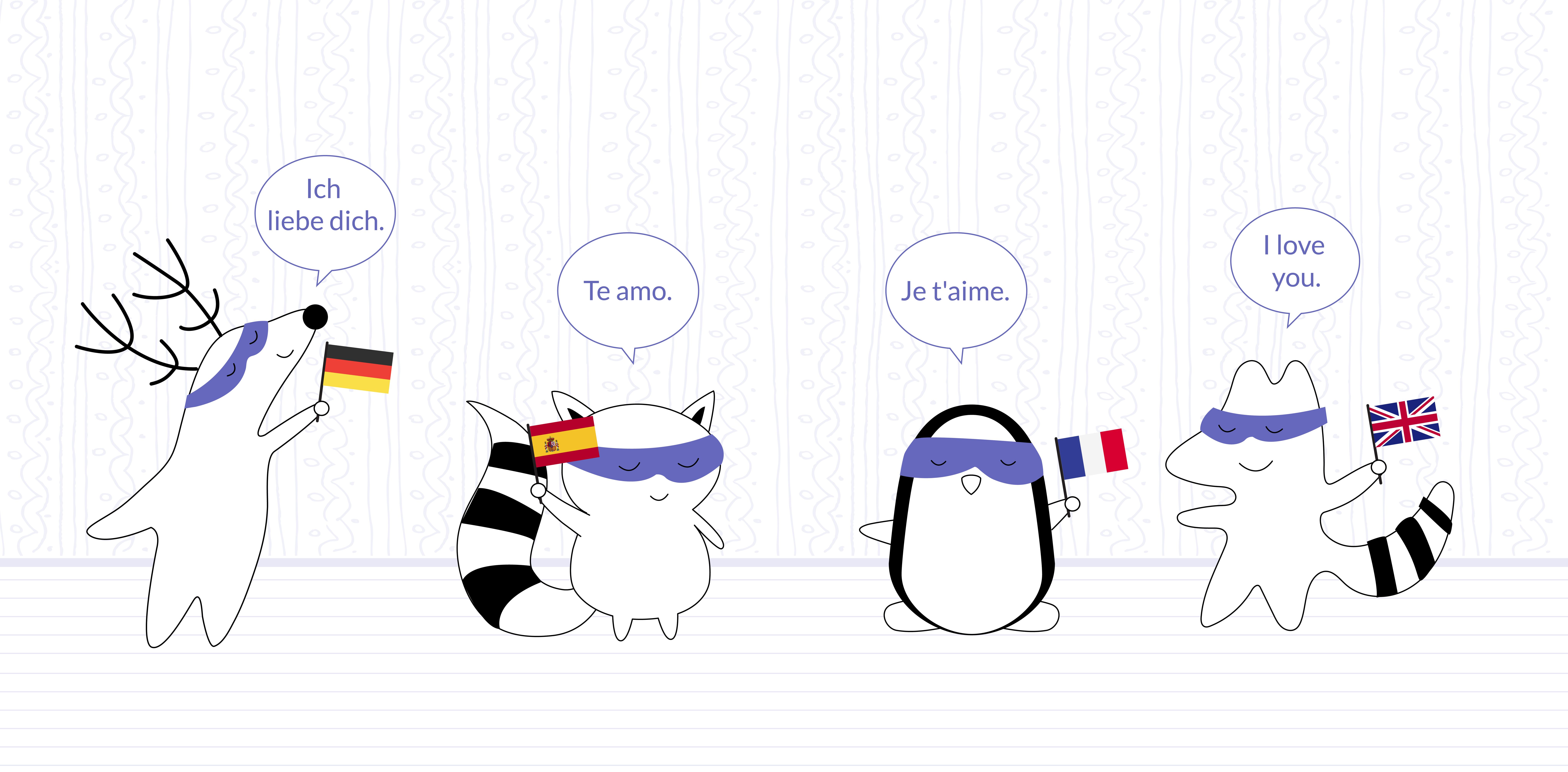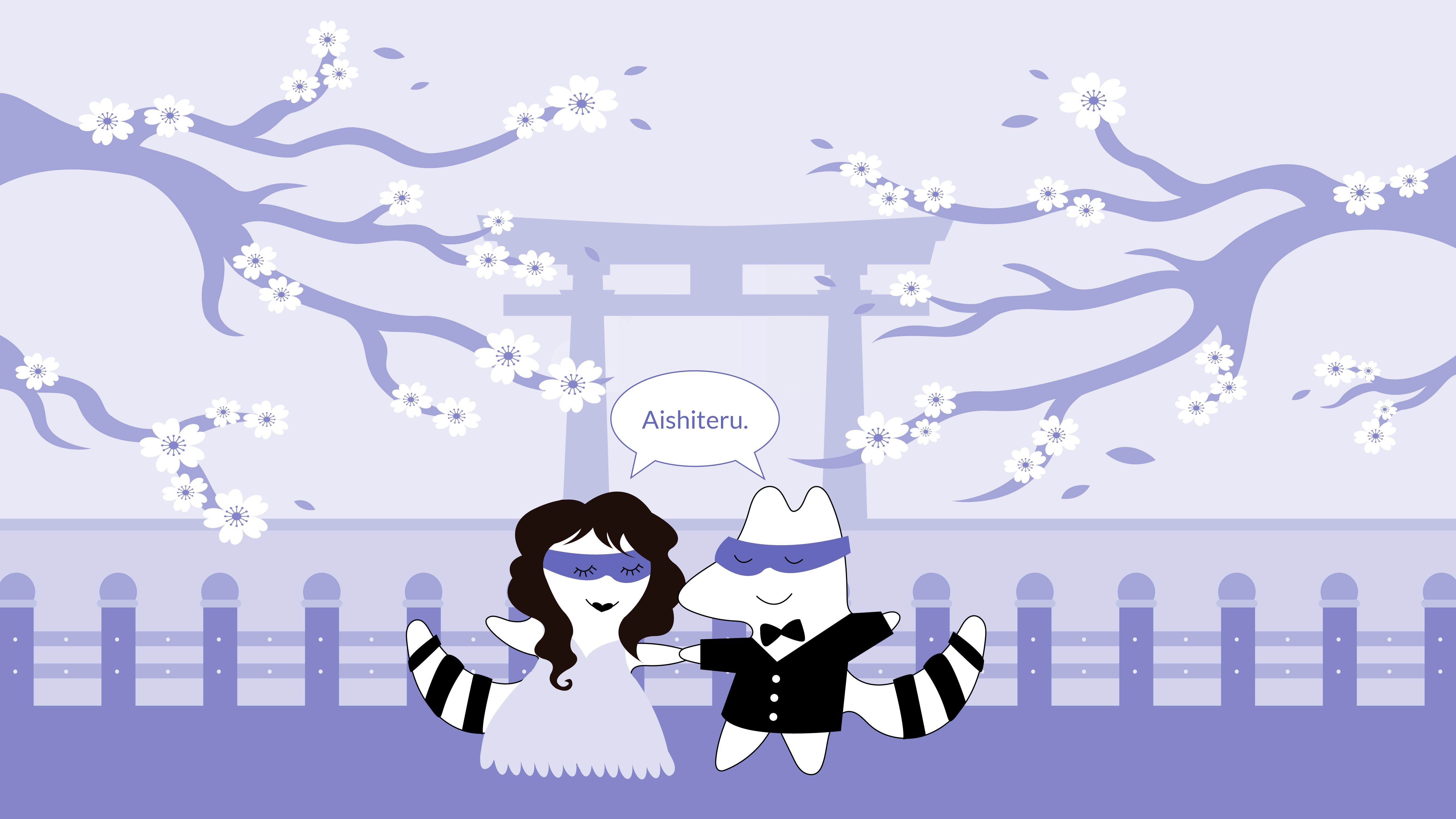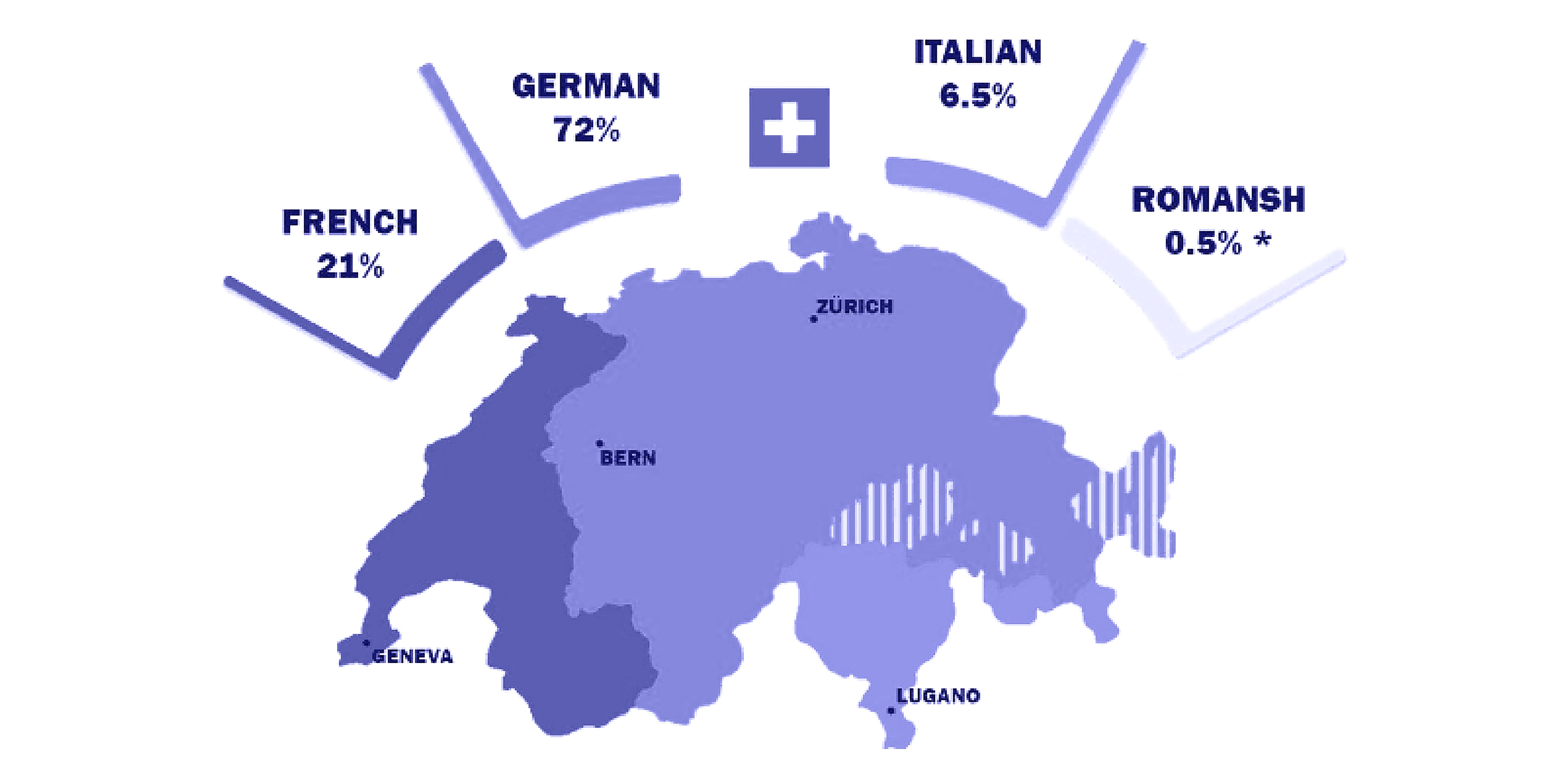
Love — a universal language spoken by all — transcends borders and connects hearts. It's a sentiment that we all feel, yet the ways we express it vary widely across cultures and languages. From passionate declarations of romance in Paris to humble confessions of affection in Tokyo, the phrase "I love you" takes on different forms and nuances around the globe.
On this journey of love, we will traverse the globe, exploring the unique ways different cultures express this powerful emotion. We will dive into the languages of love, uncovering interesting linguistic and cultural insights.
Whether you're a globetrotter looking to charm a foreign beau, a linguist studying emotional expressions across cultures, or simply a lover of love, this article promises a heartwarming exploration of “I love you” around the world. So, let's begin!
Learn English with Langster
Learn to Say “I Love You” in a Foreign Language
Before we jump into cultural nuances and alternative ways to confess your affection in other languages, let’s take a look at the table below.
| Language | “Love” | “I Love You” | Pronunciation | |
|---|---|---|---|---|
| Afrikaans | Liefde | Ek het jou lief | ||
| Simplified Chinese | 爱 | 我爱你 | Wo ai ni | |
| Traditional Chinese | 愛 | 我愛你 | Wo ai ni | |
| German | Liebe | Ich liebe dich | ||
| French | Amour | Je t'aime | ||
| Japanese | 愛 | 愛してる | Aishiteru | |
| Spanish | Amor | Te quiero | ||
| Italian | Amore | Ti amo | ||
| Portuguese | Amor | Eu te amo | ||
| Swedish | Kärlek | Jag älskar dig | Yah alska dey | |
| Russian | Любовь | Я тебя люблю | Ya tebya lyublyu | |
| Korean | 사랑 | 사랑해요 | Saranghae | |
| Indonesian | Cinta | Aku cinta kamu | ||
| Vietnamese | Tình yêu | Anh yêu em (to a woman), Em yêu anh (to a man) | ||
| Thai | รัก | ฉันรักคุณ | Phom rak khun (to a woman), Chan rak khun (to a man) | |
| Turkish | Aşk | Seni seviyorum | ||
| Czech | Láska | Miluji tě | ||
| Croatian | Ljubav | Volim te | ||
| Polish | Miłość | Kocham cię | ||
| Ukrainian | Кохання | Я тебе кохаю | Ya tebe kokhayu |
| Language | “Love” | “I Love You” | Pronunciation | |
|---|---|---|---|---|
| Afrikaans | Liefde | Ek het jou lief | ||
| Simplified Chinese | 爱 | 我爱你 | Wo ai ni | |
| Traditional Chinese | 愛 | 我愛你 | Wo ai ni | |
| German | Liebe | Ich liebe dich | ||
| French | Amour | Je t'aime | ||
| Japanese | 愛 | 愛してる | Aishiteru | |
| Spanish | Amor | Te quiero | ||
| Italian | Amore | Ti amo | ||
| Portuguese | Amor | Eu te amo | ||
| Swedish | Kärlek | Jag älskar dig | Yah alska dey | |
| Russian | Любовь | Я тебя люблю | Ya tebya lyublyu | |
| Korean | 사랑 | 사랑해요 | Saranghae | |
| Indonesian | Cinta | Aku cinta kamu | ||
| Vietnamese | Tình yêu | Anh yêu em (to a woman), Em yêu anh (to a man) | ||
| Thai | รัก | ฉันรักคุณ | Phom rak khun (to a woman), Chan rak khun (to a man) | |
| Turkish | Aşk | Seni seviyorum | ||
| Czech | Láska | Miluji tě | ||
| Croatian | Ljubav | Volim te | ||
| Polish | Miłość | Kocham cię | ||
| Ukrainian | Кохання | Я тебе кохаю | Ya tebe kokhayu |
This should serve as a handy reference for anyone looking to say “I love you” in different languages or for those simply fascinated by the diverse expressions of love around the world.
In the following sections, we’ll take a closer look at some of the cultural nuances regarding expressing your feelings in some of the countries on this list.
Je t'aime, Paris
| Je t'aime. | I love you. |
| Je t'aime. | I love you. |
The City of Love is renowned for its romantic atmosphere and affectionate culture, so it's no surprise that the French have a whole range of expressions to convey their love.
The most common phrase used to say "I love you" in French is Je t'aime. This phrase is used to express deep love and affection towards someone, whether it's a romantic partner or a close friend.
But, don't be fooled by its romantic connotation; the French can also use "Je t'aime" or other expressions to convey their fondness and appreciation for someone. It's not uncommon for French people to casually say Je t'adore to express their affection towards a friend or family member.
| Je t'adore | I adore you. |
| Je t'adore | I adore you. |

Another thing that makes the French expression of love unique is their use of endearments. These are terms of affection that are commonly used between lovers and close friends alike. For example, here are a couple of the most often-used phrases in French to express love and endearment toward a significant other:
| Mon amour | My love |
| Mon chéri | My darling |
| Mon amour | My love |
| Mon chéri | My darling |
Ich Liebe Dich, Berlin
| Ich liebe dich | I love you |
| Ich liebe dich | I love you |
As we move towards the heart of Europe, we come across Germany — a country known for its rich culture and history.
When it comes to expressing love in German, the phrase Ich liebe dich is commonly used. This phrase translates to "I love you" and is considered to be quite serious and sincere.
But, beware: in German culture, it's considered a serious commitment to say Ich liebe dich to someone. It's a phrase that is only used in romantic relationships and carries a lot of weight. So, if you're planning to confess your love in Germany, make sure you mean it!

What's interesting is that German has many words for love, and each one conveys a different level of affection. For example:
| German Phrase | English Translation | Explanation |
|---|---|---|
| Ich mag dich | I like you | Used to express fondness towards someone. |
| Ich hab dich lieb | I have love for you | Considered to be an expression of deep caring and platonic love. |
| German Phrase | English Translation | Explanation |
|---|---|---|
| Ich mag dich | I like you | Used to express fondness towards someone. |
| Ich hab dich lieb | I have love for you | Considered to be an expression of deep caring and platonic love. |
Te quiero, Barcelona
| Te quiero | I want you |
| Te quiero | I want you |
Our next stop takes us to the land of flamenco and fiesta – Spain. The most common way to say "I love you" in Spanish is Te quiero. This phrase literally means "I want you" and is used to express deep affection and love towards someone. It's often used between romantic partners and close family members.
It's interesting to note that in Spanish, Te quiero, despite its somewhat intense literal meaning, is used more frequently and casually than Te amo (I love you), which is considered to be a much deeper expression of love.
So, while the phrase may seem strong at first glance, it can also be used to express fondness and care towards your loved ones.
What sets Spanish apart is its use of diminutives (ending a word with -ito or -ita), which adds an extra layer of endearment to the expression. So, instead of just saying Te quiero, one can say:
| Te quiero muchito | I love you very much |
| Te quiero mucho, mi amor | I love you a lot, my love |
| Te quiero muchito | I love you very much |
| Te quiero mucho, mi amor | I love you a lot, my love |
Saranghae, Seoul
| 사랑해요 | Saranghae |
| 사랑해요 | Saranghae |
Moving on to the Far East, South Korea has its own unique expression of love. In Korean, the equivalent of those three words is the phrase Saranghae. This phrase is often used between romantic partners and signifies a deep and sincere love.
But, Saranghae truly special is its cultural significance. In Korean culture, the expression of romantic feelings is not as common or accepted as in Western cultures. The idea of openly expressing one's emotions towards another person can be seen as too bold or even improper.
Therefore, saying Saranghae to someone is not a simple phrase but rather a significant and courageous act of confessing one's feelings. It's a declaration of true love and commitment that is not taken lightly in Korean culture.
Aishiteru, Tokyo
| 愛してる | Aishiteru |
| 愛してる | Aishiteru |

In Japan, expressions of love take on an even more reserved and nuanced form.
While there are various expressions of love in Japanese, the most common phrase used is Aishiteru, which means “I love you.” This phrase is often reserved for romantic relationships and signifies a deep and profound love.
What sets Japan apart is its cultural norms around expressing emotions. In Japanese culture, it's considered inappropriate to express one's romantic feelings towards someone else openly.
Therefore, saying Aishiteru is not something that is taken lightly or said casually. It's a phrase reserved for special moments and deep connections.
Concluding Thoughts

From passionate declarations in Paris to reserved confessions in Tokyo, love takes on different forms and expressions around the world. But, regardless of language or culture, the sentiment remains the same — a deep and powerful emotion that connects us all.
So, next time you want to express your love, remember that the words may vary, but the feeling is universal. Words truly have the power to transcend borders and bring people together. And, what better way to do so than by saying "I love you" in a different language? Download our Langster app to learn even more words of endearment, and go ahead and spread love in every language!
Learn English with Langster









